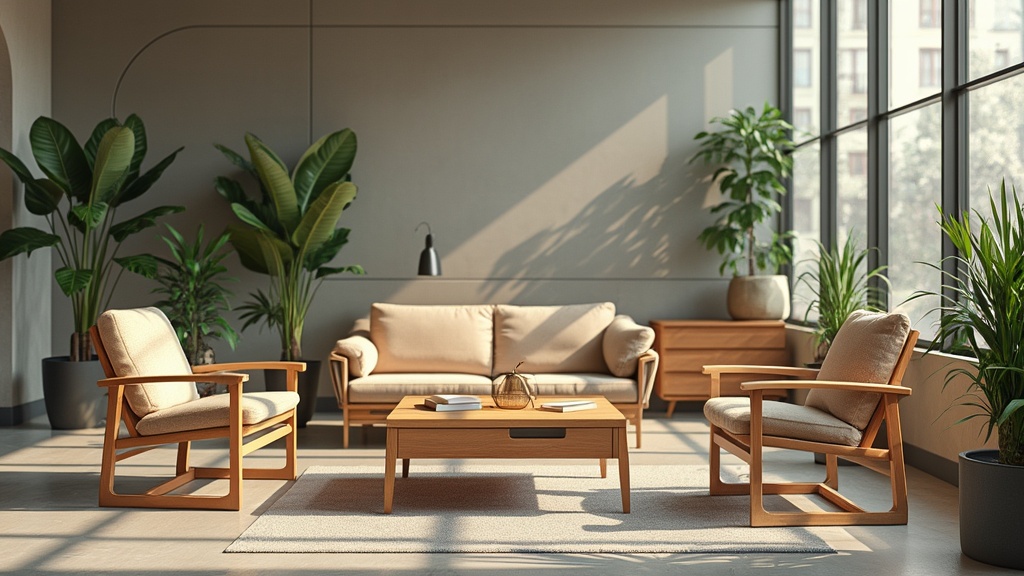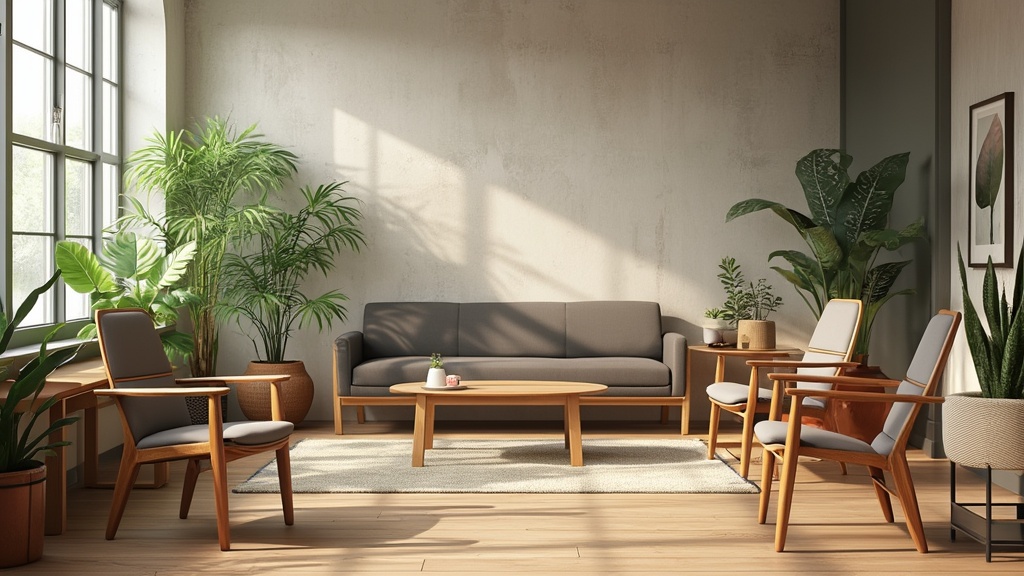Transforming spaces requires more than just basic furnishings; it calls for handcrafted pieces that resonate with individuality and quality. Handmade furniture wholesale has become a game-changer in interior design, offering unique designs that elevate aesthetics while providing functionality.
These artisan creations are not only visually striking but also reflect the care and craftsmanship behind each piece.
Contemporary consumers are increasingly drawn to the stories these items tell, making them integral to modern living environments.
By choosing handmade options, homeowners can create spaces that truly reflect their personality and values.
Click here to learn more about: wholesale home decor
Understanding Artisan Furniture Wholesale
Artisan furniture wholesale addresses the growing need for unique home decor as consumers prioritize individuality in their shopping choices. The furniture market is shifting towards bespoke furniture that offers personalized touches weaved into every design.
Artisan quality stands out in a saturated market, as handcrafted quality frequently implies superior craftsmanship and meticulous attention to detail that mass-produced items lack.
Differentiating Through Artisan Quality
Artisanal craftsmanship fosters a connection between consumers and products, creating a sense of authenticity that is highly valued. This quality can be highlighted through:.
- Unique Designs: Each piece tells a story, showcasing the creativity of furniture artisans.
- Quality Materials: Sourcing sustainable and eco-friendly finishes enhances the appeal of handcrafted items.
- Customization Options: Customers appreciate the ability to modify designs to suit their personal style.
Effective Inventory Management Strategies
Efficient inventory management strategies are crucial for wholesale distributors to meet the demands of the market. Key approaches include:.
- Leveraging Data Analytics: Utilizing analytics helps track trends and consumer preferences.
- Engaging Customer Feedback: Regularly gathering feedback can guide product development and inventory needs.
- Dynamic Pricing: Adjusting pricing in response to market demand ensures competitiveness.
“Artisan furniture not only enhances aesthetics but also promotes a sustainable lifestyle. ”
This flexibility enables businesses to cater to the growing demand for customization options and exclusive collections. By embracing these strategies, furniture suppliers can navigate the complexities of furniture distribution while supporting artisanal communities and ecological practices.

What Are Custommade Furniture Options
Custommade furniture represents a growing trend in personalized home furnishings, influenced by consumer desires for individuality and uniqueness. Homeowners increasingly pursue unique designs that resonate with their personal styles.
Collaborating with skilled artisans enhances aesthetic appeal and highlights quality materials used in each piece.
This partnership guarantees that every creation meets specific preferences, offering lasting value and durability.
Exploring pricing strategies such as dynamic pricing equips consumers to navigate the market effectively, balancing quality with budget considerations. These bespoke solutions address the rising demand for individualized designs within the furniture market.
Exploring Bespoke Furniture Benefits
Bespoke furniture embodies a significant shift in consumer choices, with a notable focus on sustainability.
Many consumers prioritize sustainable sourcing when selecting their furniture, making bespoke options increasingly appealing. These tailored pieces often utilize ethically sourced materials, fostering an eco-friendly lifestyle.
Brands that provide personalized solutions not only capture interest but also enhance customer loyalty by cultivating lasting relationships.
Studies indicate that 80% of consumers tend to repurchase from brands that deliver customized experiences.
Successful bespoke brands effectively leverage these insights, utilizing artisanal craftsmanship to create distinctive styles. They also market their unique selling propositions in competitive environments, ensuring consumer engagement and satisfaction.
- Custommade furniture allows for personalized designs that reflect individual homeowner styles.
- 80% of consumers are likely to repurchase from brands that offer customized experiences.
- Many bespoke furniture options utilize ethically sourced materials, promoting sustainability.
- Artisanal craftsmanship enhances the uniqueness and quality of bespoke furniture pieces.
The Role Of Handcrafted Pieces In Wholesale
Handcrafted pieces have gained significant traction among consumers who prioritize authenticity and connection with products. Artisan furniture is increasingly sought after as individuals gravitate towards unique designs that reflect personal values.
The challenge of scaling these custom wooden furniture items for wholesale arises primarily from the need to maintain exceptional quality while fulfilling bulk orders.
This delicate balance can strain production capacities, requiring strategic planning.
Marketing Strategies for Handcrafted Products
Effectively marketing handcrafted products necessitates highlighting the narrative surrounding each piece.
Artisans can utilize storytelling to communicate their passion and the craftsmanship excellence encapsulated in their work. Such narratives help bridge the gap between local craftsmanship and larger distribution networks, fostering consumer engagement.
Creating content that resonates across online retail platforms can enhance the appeal of your offerings, making them memorable.
Engaging with Consumers
Establishing meaningful connections with consumers through social media is essential for promoting handcrafted quality. Sharing insights into the making process or the story behind each piece can captivate an audience.
This engagement enhances brand loyalty and can lead to positive word-of-mouth, benefiting sales and visibility.
Sustainable Sourcing For Furniture Suppliers
A shift towards environmentally-friendly practices has transformed the expectations consumers have for furniture suppliers.
Sustainable sourcing is now a fundamental aspect of production that resonates with ethically-minded buyers.
Implementing ecofriendly finishes and utilizing responsibly sourced materials not only improves brand reputation but also aligns products with consumer values. Rigorous transparency in the sourcing process fosters trust, allowing consumers to feel assured about their purchasing decisions.
Importance of Certification
Certifications such as FSC (Forest Stewardship Council) and Greenguard can effectively verify sustainable practices, underscoring a commitment to ethical manufacturing.
These certifications signal to consumers that furniture suppliers are actively engaging in responsible forestry and environmental stewardship. Brands that prioritize sustainability are more likely to capture the attention of the growing eco-conscious products market.
Building Consumer Trust
Transparent sourcing strategies enable furniture suppliers to establish credibility with their customer base.
When consumers can trace the origins of their furniture, it enhances their confidence in making purchases.
This trust is pivotal in developing long-term relationships with clients who are increasingly aware of their environmental impact.
The furniture market’s trends now favor suppliers who adopt sustainable practices, thus reflecting the evolving consumer preferences towards quality assurance and environmental responsibility.
Handcrafted Products and Sustainable Sourcing
- Consumers are increasingly willing to pay a premium for handcrafted items that reflect their personal values and authenticity.
- Over 70% of consumers prefer brands that are transparent about their sourcing and production practices.
- Furniture companies that adopt sustainable practices see a 30% increase in customer loyalty and retention.
- Products with certifications like FSC and Greenguard are 50% more likely to be chosen by eco-conscious consumers.
How To Choose Quality Materials In Bulk
Identifying quality materials serves as a foundation for producing exceptional products, especially within the realm of furniture manufacturing. The choice of materials impacts key aspects such as durability, aesthetics, and functionality, which collectively influence customer satisfaction.
To ensure consistent quality, businesses must identify trustworthy suppliers who specialize in high-grade materials.
Additionally, evaluating supplier certifications concerning sustainable sourcing not only guarantees adherence to quality standards but also supports ethical manufacturing practices.
Conducting thorough research on potential suppliers enhances the reliability of bulk orders and strengthens the quality assurance process.
When making bulk purchases, businesses should implement effective strategies to maintain quality, such as conducting sample tests to assess materials’ performance prior to order confirmation.
Furthermore, implementing quality audits upon receiving products ensures that any discrepancies are addressed promptly, safeguarding the integrity of the final items. This proactive approach ultimately reflects the high standards of craftsmanship excellence expected in the competitive market of artisan furniture.
Engaging With Retail Partnerships For Growth
Forging strong retail partnerships significantly amplifies market reach and boosts sales growth.
Collaborative relationships among retailers and manufacturers enhance brand visibility, exposing businesses to new customer segments that were previously inaccessible. Building these relationships requires a focus on prioritizing communication to align goals between partners, fostering an environment that promotes mutual success.
Creative collaborations can lead to the development of exclusive collections, enabling brands to stand out in a saturated market.
Companies should also develop joint marketing strategies that utilize the unique strengths of each partner, maximizing both impact and customer engagement.
By synergizing efforts, businesses can effectively penetrate niche markets and swiftly adapt to shifting design trends.
This collaboration can enhance overall growth potential, reinforcing the strength of distribution networks within the furniture market.
Quality Materials and Retail Partnerships
- Quality materials can extend the lifespan of furniture products, leading to increased customer satisfaction and loyalty.
- Research shows that businesses that conduct supplier evaluations experience a 20% reduction in material defects.
- Effective retail partnerships can increase sales by up to 30% through enhanced brand visibility and access to new markets.
- Joint marketing strategies can lead to a 25% increase in customer engagement by leveraging the strengths of each partner.
What Are The Latest Design Trends In Artisan Communities
Artisan communities are witnessing a remarkable shift towards unique designs that narrate personal stories. These trends demonstrate a growing consumer preference for handcrafted pieces that not only appeal aesthetically but also prioritize sustainability.
This shift drives artisans to integrate eco-friendly finishes and embrace responsible forestry practices, which collectively enhance the environmental footprint of their creations.
Contemporary Aesthetics and Customization
Artisans are skillfully merging traditional craftsmanship with modern aesthetics, resulting in bespoke furniture that resonates with contemporary tastes.
Customization options, such as individualized designs, are increasingly becoming essential as they create deeper connections with clients.
Key trends in this area include:
- Artisanal craftsmanship that emphasizes unique, handcrafted quality.
- Use of quality materials sourced sustainably to promote eco-conscious products.
- Creative collaborations that yield exclusive collections appealing to niche markets.
Staying Informed Through Community Engagement
Engagement in local artisan markets is crucial for artisans seeking to remain attuned to shifting design trends and consumer preferences. Participation in these events allows artisans to gather valuable insights while also showcasing their distinctive styles. Leveraging online retail platforms can be a dynamic strategy for broader reach. These platforms enable artisans to connect with wholesale distributors and build robust distribution networks, enhancing their visibility in a competitive furniture market.
To further adapt to emerging trends, artisans should:.
- Regularly explore design workshops and forums to exchange ideas.
- Monitor social media platforms for trendsetting designs in the artisan community.
- Collaborate with interior design solutions professionals for innovative inspiration.
By actively participating in community engagement and embracing new opportunities, artisans can effectively navigate changing market demands while maintaining their commitment to exceptional craftsmanship.
Artisan Design Trends
- Handcrafted products are increasingly favored by consumers, with 79% preferring unique items over mass-produced alternatives.
- Eco-friendly materials in artisan products can lead to a 30% increase in sales, reflecting the consumer shift towards sustainability.
- Customization options can enhance customer loyalty, with 60% of buyers willing to pay more for personalized designs.
- Participation in local artisan markets can increase visibility and sales by up to 50% for emerging artisans.



